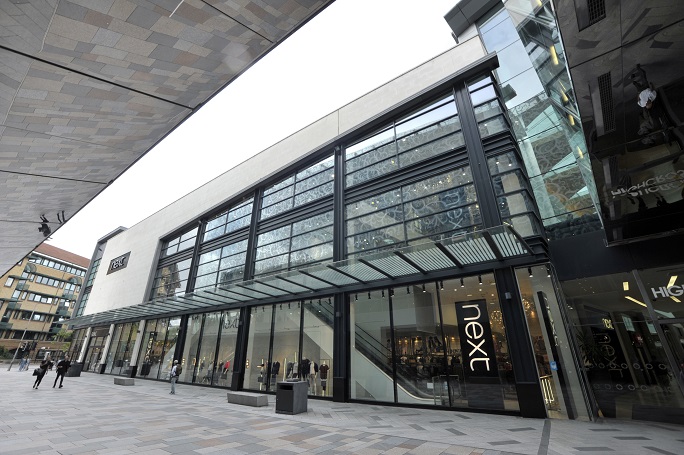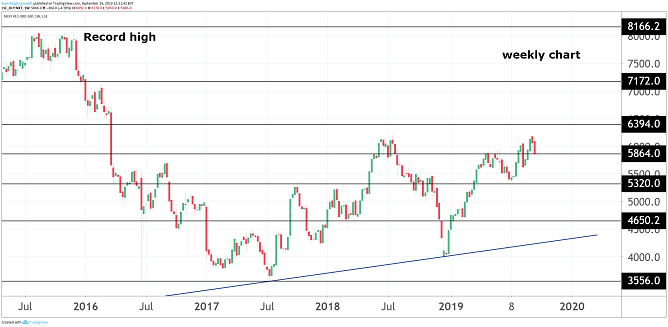Next shares a 'buy' after price tumble?
As usual, Next blames the British weather for disappointing sales, but the shares have outperformed.
19th September 2019 12:36
by Graeme Evans from interactive investor
As usual, Next blames the British weather for disappointing sales, but the shares have outperformed.

September warmth rather than the heat of Brexit today put the brakes on Next (LSE:NXT) shares following a stunning rally in which the FTSE 100 stock had rallied by more than 50% in 2019.
A typically detailed set of interim results predicted the current quarter would be the weakest of the year, although there's no need to row back on July's upgraded guidance, when Next forecast slightly higher annual profits of £725 million and full-price sales growth of 3.6%.
Shares rose 10% after July's trading statement, but were back below 5,900p today after the update on the retail climate triggered a 5% fall. Next isn't short of supporters, however, with Liberum reiterating its 6,500p price target and analysts at UBS at 6,300p.
Next is one of a select band of retailers whose shares have defied the choppy trading conditions, with the others including JD Sports Fashion (LSE:JD.), Dunelm (LSE:DNLM) and WH Smith (LSE:SMWH). Marks & Spencer (LSE:MKS), in contrast, is half the value of Next's £8 billion market cap after its shares fell by 16% in 2019.

Source: TradingView Past performance is not a guide to future performance
Lord Wolfson, who has run Next since 2001, continues to put rivals in the shade with a trusted trading formula in which the sprawling shop estate still has a big role to play. While today's half-year retail sales were down 5.5% and profits 23.5% lower, the company insists the stores are not a liability if they provide a point for online customers to collect and return their orders.
It points out that 50% of online orders are delivered to stores, while 82% of returns come back through the 499-strong shop estate.
Online sales topped £1 billion and now exceed the figure for retail following growth of 12.6% in the period. This was driven by the expansion of Label, which grew full-price sales by 25.8% to £199 million and now expects to generate £500 million of revenues this year. Label sells third-party ranges from brands including Adidas (XETRA:ADS), Boohoo (LSE:BOO) and French Connection (LSE:FCCN), meaning that Next is effectively competing against itself by opening up its infrastructure to others.
However, the upside from this arrangement is the ability to utilise the asset base twice and make the Next platform the first-choice online destination for clothing and homeware.
The strong online performance helped half-year group profits rise 2.7% to £320 million, which was slightly better than UBS expected after gross margin declined by less than thought.
Next admitted the first few weeks of the autumn season had been disappointing, adding that it was hard to tell if Brexit was having an effect on consumer spending:
"We believe that the warm start to September has done much more to hinder sales than the political temperature."
As November was particularly warm last year, it's likely that comparisons will soften later in the financial year. Next added: “Our experience is that political storms, of themselves, rarely affect sales and consumers only change their behaviour when those events directly impair their income or increase their non-discretionary expenditure.”
Based on its Brexit preparation and impact document, which has just been updated on the company's website, Next said it remains comfortable about the UK's departure from the EU as long as ports continue to operate effectively.
It added in the results:
"Our view is that Brexit will only materially affect consumer spending in the event that it triggers inflationary pressure on prices or logistical problems at our ports."
The retailer, which increased its interim dividend by 4.5p to 57.5p, continues to return surplus cash to shareholders after £280 million of shares were bought back in the first half of the year. It has a target of £300 million for the year, with the dividend yield for 2020 currently standing at 2.8%.
Since January 2015, Next has returned £1.7 billion to shareholders through special dividends (£685 million) and share buybacks (£1 billion). The earnings boost from these share buybacks means that EPS in the year to January 2020 is likely to be 9% higher than five years ago and the highest EPS the group has delivered.
In March, the company's 15-year stress test scenario under which retail like-for-like sales declined every year by 10% still showed the company generating £12 billion of cash over the period, including £1.1 billion in the final year.
These articles are provided for information purposes only. Occasionally, an opinion about whether to buy or sell a specific investment may be provided by third parties. The content is not intended to be a personal recommendation to buy or sell any financial instrument or product, or to adopt any investment strategy as it is not provided based on an assessment of your investing knowledge and experience, your financial situation or your investment objectives. The value of your investments, and the income derived from them, may go down as well as up. You may not get back all the money that you invest. The investments referred to in this article may not be suitable for all investors, and if in doubt, an investor should seek advice from a qualified investment adviser.
Full performance can be found on the company or index summary page on the interactive investor website. Simply click on the company's or index name highlighted in the article.